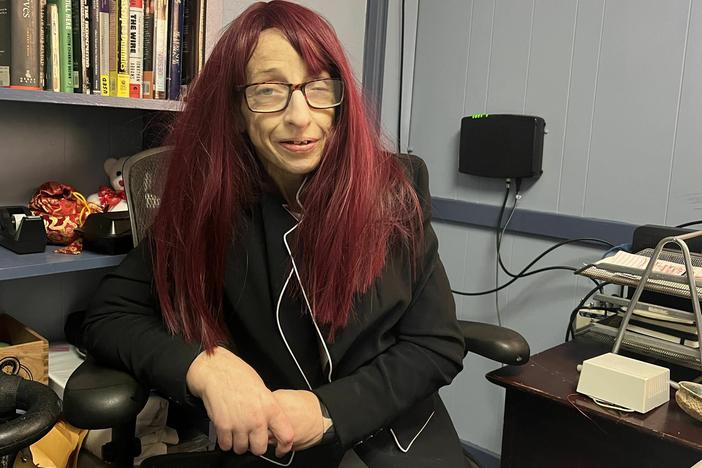Section Branding
Header Content
Florida saw its seventh case of malaria this summer. One woman shares her ordeal
Primary Content
Malaria is still a worry in Sarasota, Fla., where officials recently confirmed the seventh locally transmitted case so far this summer. A 39-year-old woman describes her symptoms and hospital ordeal.
Transcript
AYESHA RASCOE, HOST:
Malaria cases not involving international travel are being reported in the U.S. for the first time in two decades, with fingers pointing at local mosquitoes for doing the infecting. Officials in Sarasota, Fla., confirmed the seventh case so far this summer. Here's Stephanie Colombini of member station WUSF.
STEPHANIE COLOMBINI, BYLINE: At first, Hannah Heath thought she might have food poisoning. She was vomiting and had chills and a fever. But four days passed, and she was still really sick.
HANNAH HEATH: Finally, I called my husband, and I was like, you have to take me to the ER. I think I'm dehydrated. I think I need an IV.
COLOMBINI: This was in late June, and Heath hadn't yet heard that malaria cases were cropping up in the county. But the doctors at Sarasota Memorial Hospital were on the lookout, and a blood test confirmed malaria.
HEATH: I was just like, you're kidding me, right? Because I haven't been outside the country.
COLOMBINI: The U.S. typically sees a couple thousand travel-related malaria cases a year. It's caused by a parasite. People get bit by infected mosquitoes while they're in another country, but symptoms don't appear until they get to the states. But local transmission is highly unusual and hasn't happened in the U.S. since 2003, when eight people got malaria in Palm Beach. Heath is one of five patients treated at Sarasota Memorial during this summer's outbreak.
HEATH: It was just a weird experience, and I was just miserable.
COLOMBINI: Heath is 39 and normally in great health, but the malaria was exhausting and gave her pounding headaches. Her platelet count dropped, and that increased risk of internal bleeding. Heath couldn't get out of bed without help, and her hospital bed had padding around the side rails to prevent bruising. The hospital's infectious disease doctor, Manuel Gordillo, says some of the other patients experienced similar complications, but in each case staff could manage it.
MANUEL GORDILLO: This has been around for years. There's good treatments. There's straightforward diagnoses.
COLOMBINI: The doctors gave Heath anti-malaria medications to clear the blood infection. After five days, she was discharged, but she recently started a new round of meds at home. Those target malaria parasites that can hide out in the liver and cause a relapse.
HEATH: I do appreciate that they knew how to take care of it, and I'm feeling great now.
COLOMBINI: So far, all the Florida cases have been in northern Sarasota. County mosquito management workers have been busy since the first case was confirmed May 26. They've ramped up monitoring for Anopheles, the species that can spread malaria. And they're strategically spraying insecticides to kill adult mosquitoes in the air and immature ones in the water. With a seventh case confirmed, Manager Wade Brennan says workers are scouring woods, ponds and other places to see if they've missed anything.
WADE BRENNAN: This is what our crews are focused on, but when it comes to private property, we need everybody's help.
COLOMBINI: That means checking your property for standing water that could attract mosquitoes. The county sent 140 mosquitoes to the Centers for Disease Control for testing. Three came back positive for malaria, but none since early June. Malaria doesn't spread from person to person. A mosquito carrying the disease has to bite you. Brennan says the best protection is to use repellent and cover up.
BRENNAN: It's just so important. If we can stop those mosquito bites, we can stop this from going any further.
COLOMBINI: Hannah Heath is definitely on board. Since she's come home, she makes sure she, her husband and her 6-year-old son have bug spray when they go outside.
HEATH: I don't want anybody to go through that, but I'm just thinking, like, I don't want to see my son go through what I went through, so I'm more aware of it.
COLOMBINI: Heath says her neighbors in the Sarasota area should seek treatment quickly if they have malaria symptoms. But for most Americans, the risk of this disease is extremely low.
For NPR News, I'm Stephanie Colombini in Tampa.
RASCOE: This story comes from NPR's partnership with WUSF and KFF Health News. Transcript provided by NPR, Copyright NPR.
Bottom Content



